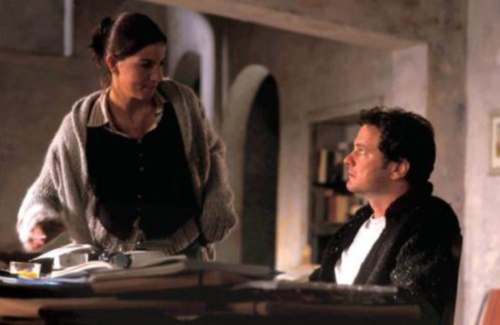As time moves further away from 2003 and the accepted flagrant sexism that came with it–paraded with perhaps the most glee of all in film even more than TV–Love Actually continues to depreciate in, let’s say, realistic value. Not that rom-coms are exactly known for favoring realism in any way, shape or form (unless, one supposes, we’re talking about Spike Jonze’s Her because, yes, falling in love with your OS seems more likely than doing so with any subpar human being these days). And yet, Love Actually increasingly appears to have gone out of its way to be as over the top in schmaltz and cliches as possible. Like even well beyond the Garry Marshall level.
Released on the heels of his one-two punch writing successes, 1999’s Notting Hill and 2001’s Bridget Jones’ Diary, Richard Curtis took the director’s chair for Love Actually in addition to writing the script (what’s worse, likely with the scrupulous eye of his scriptwriter/editor spouse, Emma Freud, to review it, and who ought to have at least somewhat reigned in the palpable misogynist elements). Structured as intertwined vignettes, each one possesses its own special incongruity, however there is one in particular that stands out for its absurd datedness in terms of a certain chauvinistic fetish: the proverbial “master” falling for his “slave” and vice versa. In this case, it’s recently jilted Englishman Jamie (Colin Firth) and his sudden Portuguese cleaning woman, Aurélia (Lúcia Moniz). Enlisted to help him care for his ostensibly Southern France property while he takes time to write a presumably shitty white man’s novel, Aurélia, predictably, begins to take a shine to Jamie despite not speaking a word of English and the overt fact that she is much younger and more attractive. While, sure, it’s been said that true love transcends all language barriers, the fact that Jamie isn’t even interesting when unable to be comprehended (likely part of the reason his wife cheated on him with his brother) doesn’t make a very strong case for Aurélia to fall for him except for the caveat of surrendering to Curtis’ master-slave model for male-female relationships.
Of course Jamie relishes his so-called alone time being infiltrated by a woman who cleans and (likely) cooks for him. What man doesn’t love a live-in servant when he can’t even seem to hold down an unpaid woman without losing her to someone less vanilla in bed? Aurélia’s willingness to do just about anything to please and appeal to Jamie reaches a zenith when she throws herself into freezing, eel-infested waters to attempt rescuing his poppycock manuscript. Granted, he reluctantly joins her, but solely because he is tantalized by the sight of her undressed cuerpo. After all, maid-oriented tasks can provide quite a sculpting effect on the body.
Though Jamie and Aurélia are hardly the only examples of Curtis’ seeming fondness of this model for “romance” in the film–David (Hugh Grant) and Natalie (Martine McCutcheon) also embody it with her as the prime minister’s servant…of chocolate-covered biscuits and tea–they are the most blatant and literal. That millennial teens, whether British, American or otherwise, were peddled this archetype, already at that time in long overdue need of being eradicated thanks to the likes of Sabrina, My Fair Lady and, just the year before Love Actually came out, Maid in Manhattan, is one of the great cinema-related scandals of the 00s. For how could anyone, in good conscience, greenlight a film that so flagrantly paints the servant woman as “hot, manipulable ass” to the more affluent Anglican male?
The fact that Aurélia’s more homely (a.k.a. more portly) older sister follows her father down the streets as he takes Jamie to the restaurant where Aurélia now works and points out to anyone who will listen, “Father’s about to sell Aurélia into slavery!” is not without veracity. And yet, Curtis’ intent to make this come off as a joke only lends further grains of undeniable truth to the notion that the master-slave dynamic is what appeals not just to males, but, worst of all, females gorging on rom-com slop until they literally cannot think with any rationality.
While, to be sure, Love Actually will likely forever remain a neo-classic of the Christmas movie genre, to subsequent generations hopefully not aroused by the subjugator/subjugated rapport (at least not if BDSM isn’t involved), it can only end up continuing to age rather unfavorably in terms of presenting the egalitarian when it comes to heteronormative relationships (because obviously there was no “gay shit” in such a mainstream 00s movie).





















